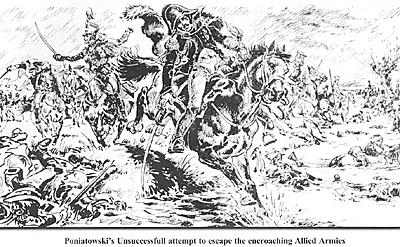The Battles Around Leipzig
October 1813
The Escape Route and Poniatowski
by DH Parry
Edited by Gay Gibson
| |
The Escape Route is Mined Dulauloy entrusted Colonel Montfort of the Engineers to form fougasses beneath the bridge, which were to be fired instantly on the approach of the enemy; Montfort handed over the charge of the mines to a corporal and four sappers, and everything being ready they listened to the uproar growing louder and louder in Leipzig, and watched the stream of retreating humanity which still poured towards them over the marshes. The bulk of the Guard and the best part of the baggage had already passed through Lindenau; regiments, squadrons, batteries, and stragglers had been going by for many hours, and but for the crash of musketry in the distance, it seemed as though the crowd then on the causeway must be the last of the Grand Army to leave the city. Sacken, Bülow, and Bernadotte's Swedes, gained a foothold about the same time; the Young Guard stood at bay in the cemetery of Grimma, sallied out, were repulsed, and died almost to a man among the graves, fighting to the bitter end. Not for the first time, nor the last, that French valour has showed itself at its best in “God's acre." The Russians carried the outer Peter's Gate, and fell with tremendous violence on the rearguard in Reichel's garden; the Baden Jägers bolted from the inner gate without firing a shot, and afterwards turned their weapons on the defeated French. The wild burden of the “Stürm” march rang through the streets with loud huzzahs and shouts of "Long live Frederick William!” as the Prussians entered the Grimma Gate; the Halle suburb and the northern side of the city were in the enemy's hands, in spite of Reynier and his men; but still the French maintained an heroic resistance. The houses of Leipzig were tall, with many landings, and some of those landings have their legends even now! But while they were fighting with a fierceness that increased as they felt the superior weight of numbers was surely if slowly overpowering them, a loud explosion boomed in their rear towards the marshes and the causeway, and a whisper followed it: “We are cut off; the bridge has been destroyed!” The whisper became a cry - a wave of panic followed it; the gallant bands left the streets and yards and gateways, and rushing to the head of the causeway, found the rumour true! Under the walls of the city the Elster approached very close to the Pleiss, and ran roughly parallel with it until the two rivers joined; across the Pleiss and the first narrow strip of swamp the horrified rearguard could pass, but no farther. A gulf yawned between them and the continuation of the causeway, isolating every soul in Leipzig from their more fortunate comrades at Lindenau. Alarmed by the low shakoes of Sacken's light infantry, who had got into the Rosenthal Island close to the bridge, the corporal had fired his train and shattered the only means of escape. A panic followed and the enemy were not slow to take advantage of the circumstance, which in a moment had transformed a resolute foe into a mob of frantic fugitives. Napoleon sent the 23rd and 24th Chasseurs full trot towards Leipzig, where they rescued about 2,000 men, who managed to scramble through the Elster, among them Marshal Macdonald, who arrived stark-naked, and who was hastily rigged out and mounted by Colonel Marbot on his own led horse. Lauriston, reported drowned in the bulletin was taken prisoner in full uniform, over which he had thrown an old drab greatcoat; and, including those captured in the battles, 30,000 men, 22,000 sick and wounded, 250 guns, and upwards of 1,000 wagons fell into the hands of the allies.
Poniatowski's heroic end is well known. When everything was lost he drew his sabre, and with his left arm in a sling, for he had been wounded again during the morning, he exclaimed to the little band of officers and mounted men that still surrounded him: “Gentlemen, it is better to fall with honour than to surrender!” and straightway dashed into a column that interposed between him and the river. Poniatowski’s unsuccessful attempt to escape the encroaching Allied Armies A bullet struck him, strangely enough, through the Cross of the Legion of Honour on the breast of his gala uniform of the Polish Lancers, but he cleared the column, and leaped down the steep boarded banks into the Pleiss, where he lost his charger, and was helped out on the other side thoroughly exhausted. Somebody gave him a trooper's horse, and on it he managed to cross the intervening marsh and plunge into the Elster, but the animal had no strength to mount the farther bank; the mud was deep, its hind legs became entangled, and falling backwards on to the weary man, steed and rider disappeared! Five days after, a fisherman recovered the body, still wearing the diamond-studded epaulettes, and rings on many fingers. It was embalmed and ultimately buried in the cathedral of Warsaw, a monument being erected on the banks of the Elster by M. Reichembach, the banker, from whose garden the unfortunate prince sprang into the river, the actual spot being now covered by a handsome quay. The Battles Around Leipzig October 1813
Opening Manoeuvres The Action Opens Latour-Maubourg Falls Decision to Evacuate The Escape Route and Poniatowski The Bridge Explodes Large Map of Leipzig Area (slow: 97K) Back to Table of Contents -- First Empire # 74 Back to First Empire List of Issues Back to MagWeb Master Magazine List © Copyright 2004 by First Empire. This article appears in MagWeb.com (Magazine Web) on the Internet World Wide Web. Other articles from military history and related magazines are available at http://www.magweb.com |
 The Fall of Poniatowski
The Fall of Poniatowski